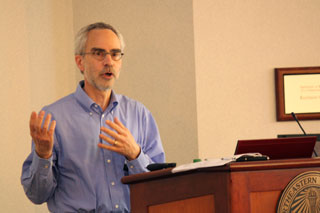ADSA09 Speaker-Call
Ninth Workshop for Algorithm Development for Security Applications:
New Signatures for Explosive Detection for Aviation Security
Call for Speakers
May 7-8, 2013
Northeastern University
Boston, Massachusetts
The Department of Homeland Security (DHS) is pursuing the development of improved explosive detection equipment for aviation security by stimulating the involvement of researchers from academia and industry other than the existing vendors of explosive detection equipment. One tactic that DHS is using to stimulate this involvement is to sponsor a series of workshops addressing the research opportunities that may enable the development of next-generation algorithms. The series of workshops are entitled “Algorithm Development for Security Applications (ADSA).” The workshops were convened by Professor Michael B. Silevitch (Northeastern University) as part of the DHS Center of Excellence (COE) for Awareness and Localization of Explosives-Related Threats (ALERT). Over time the scope of the workshops has expanded to also discuss hardware solutions. Eight work workshops have been conducted to date. The workshop attendees include people form vendors, academia, DHS, TSA and National Labs. Additional details on the previous workshops can be found on the strategic studies pages.
The main focus of ADSA09 will be emerging signatures for detecting explosives. The term signature, in this context, means either a new form of interrogation (e.g., Muon Tomography) or a variation of extant forms of interrogation (e.g., spectral CT). The interrogation includes analysis of detected information to generate signatures that can be used to indicate the presence of explosives without generating significant numbers of false alarms. Applications for the new signatures include direct inspection of checked baggage, divested items at the check point, passengers, cargo or in standoff situations. The systems could be stand-alone (e.g., satisfying all of a TSA requirement specification) or fused with other technologies.
Presentations should address, if possible, the following topics.
- Phenomenology being exploited for explosive detection
- Advantages and disadvantages of the method over other methods
- Limitations based on concealment, containment, explosive type, minimum mass and other factors
- Time and barriers for commercialization
- Concept of operations and applications
Notes
- Other topics that will be addressed at ADSA09 will include the ALERT reconstruction and ATR initiatives
- The final report and the presentations will be placed in the public domain. Therefore, classified and SSI material may not be presented
- Travel expenses will be paid for speakers working in academia.
The workshop is being organized by the following people:
- David Castanon, Boston University, [email protected]
- Carl Crawford, Csuptwo, [email protected]
- Harry Martz, Lawrence Livermore National Laboratory, [email protected]
- Carey Rappaport, Northeastern University, [email protected]
- Michael Silevitch, Northeastern University, [email protected]

Innovation Fast Track
EXCLUSIVE TO CENTER MEMBERS: Log in to explore your Innovation Fast Track, an online portal that gives you one-stop access to center researchers, funding opportunities, exclusive events and more.
Learn MoreStudent Central
Students, get connected with Industry Partners, find out about research and volunteer opportunities within ALERT, or get advice on how to best showcase your work at Student Central.
Learn MoreThe Partnership
ALERT is led by Northeastern University (NEU) and includes three key academic strategic partners: Boston University, Purdue University, and University of Rhode Island (URI).
Learn More